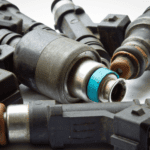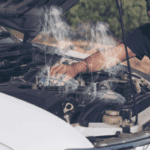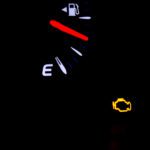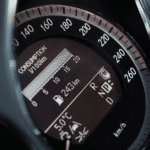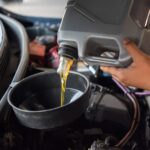Have you ever been driving and noticed that your car’s oil pressure light comes on or the gauge shows a lower-than-normal reading? If so, you might be wondering what could be causing this problem.
Low oil pressure is a red flag that indicates something may be wrong within the engine, and not necessary with the oil itself as you might presume.
In this article, we will explore some of the potential reasons for low oil pressure and how you can fix them. So if you’ve been asking yourself, “What could be causing my car’s low oil pressure?” read on to find out more!
Leading Causes of Low Oil Pressure
You must locate the main reason for your problem to address it adequately. In any case, it’s helpful to be familiar with the most frequent explanations.
- The Engine Has Insufficient Oil
Even if the right amount of oil was put in during an oil change, oil could be leaking through the seals or burning because the piston rings are worn. A simple remedy might be as easy as examining the oil level and adding more if you notice your engine burning through more oil as it ages.
Even if the engine is relatively young, you must keep up with consistent oil changes to avoid low oil levels. Because of this, you should check the oil level often and change the oil at the right times.
- Inadequate Viscosity Level
Inadequate oil viscosity levels can lead to low oil pressure levels. When the fluid’s viscosity is low, there is less friction to slow the flow. Too much viscosity may reduce pressure because it causes the injected oil to encounter more friction than usual.
The viscosity of oil in an engine depends on several things, such as the lubricant, the temperature at which the engine is running and the presence of impurities like glycol and soot. Because of this, the engine or car manual should suggest specific viscosity grades based on how the vehicle will be used.
Particularly during cold-weather engine starts, a higher viscosity may cause some problems. In particularly cold climates, you should also consider using an oil heating system and choosing the right viscosity of the lubricant.
Oil lowering in viscosity can be caused by water contaminating the oil and overloading the engine.
- Low oil Pressure
An engine’s oil pressure gauge typically displays the current oil pressure inside the engine. Even though a lower viscosity is better for lubrication systems, measuring it with a pressure gauge will show a lower pressure than an oil with a high viscosity. You may rest easily unless the pressure drops below or above the typical range. In addition, some lubricants may exert more pressure than others.
- Engine Wear
Low pressure in engines with a lot of miles on them and an oil level between “low” and “full” on the dipstick is most likely caused by worn components such as bearings. Too much use causes the initial flow restriction to weaken, lowering pressure.
- Incorrect Oil Pressure Gauge
A broken gauge can give faulty readings of the oil pressure. If the oil pressure LED is on after you’ve checked the oil level and how the engine is running (listening for strange sounds and looking for excessive heat), you may have a broken sending unit.
A gauge check of the oil pressure is something you could do. For example, if the sensor is replaced but the warning light or low indicator reading stays on, the oil pump may be the culprit.
- Deterioration of the Oil Pump
A worn oil pump will not provide enough pressure because of leaks inside the mechanism. Put a halt to further driving until the problem is resolved. Driving with a dodgy oil pump will result in the oil not being pumped where required. Dry engine internals will cause damage to appear inside the engine quickly.
- Clogged Filter
If the oil filter gets clogged with dirt and the bypass valve doesn’t work right, the lubricant might not get where it needs to go.
When oil is pushed beyond its limits, it may cause the filter to get blocked. Contamination from water and soot might also have a role. Most water comes from leaks in the cooling system, while too much soot can be caused by poor combustion.
- Gasket Failure
A failed internal gasket, or the head gasket itself, will allow the oil to either become contaminated with water or escape into parts of the engine where it shouldn’t be. Oil leaking internally or externally will cause a drop in oil pressure.
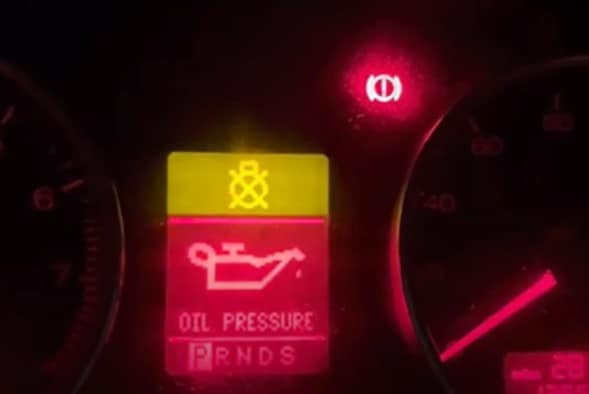
Preventing Oil Pressure Drops
Maintaining a regular oil and filter change schedule will help keep your engine’s oil pressure from dropping below safe levels. In addition, be sure you’re using lubricants that meet the vehicle’s requirements.
Check for oil leaks in the engine and the garage floor if you notice a rapid oil level drop. As an added precaution, especially with high-mileage engines, keep an eye out for blue smoke from the tailpipe.
If your car’s pressure sensor or check light is blinking and you have no idea why, do not drive the vehicle.
What Happens if You Ignore the Signs of Low Oil Pressure?
If you continue to drive with low oil pressure, you will experience a loss of performance, and eventually, the car may shut off as the engine will seize. You will typically experience many warning indicators, such as those on the dashboard, an overheating engine, smoking engine and burning smells. So getting to the point of engine failure can be avoided.
Conclusion
If your engine suddenly has less power, it could be a sign of low oil pressure. The first step is determining whether anything as easy as an oil and filter change is required, so check your oil level.
Reduced oil pressure is a warning sign that something is wrong. Inadequate lubricant circulation is another implication. It’s important to remember that if your engine runs out of oil, it will fail. An engine may die in hours or minutes, depending on the circumstances. As a result, the repair might be pricey.


